- Home
- Beryl Kingston
Octavia Page 2
Octavia Read online
Page 2
They worked in silence for a few minutes except for the splash of water, the occasional plop of the gaslight and the soft frotting of bread on wallpaper. Octavia found that it was easier to press the cloth into the carpet if she stood on it and, as there was no one around to tell her she shouldn’t, that was what she did. She was impressed by the way the maid was easing the tea stains from the wallpaper with her slice of bread, brushing down and down, always in the same direction. And Mary was touched by the child’s determination, wringing out the cloth with those skinny little hands and going at it like a good ’un. She might be a bit of a pickle, she thought, but she’s got spunk. There’s no denying that. An’ she could’ve ratted on her cousins. They was every bit as bad as her. But she never.
After a while, Molly appeared with the second tea tray and carried it carefully upstairs, cups rattling. They could hear the clatter from the kitchen, the clink of cutlery in the dining room, the regular tick of the hall clock. And at last the carpet was clean again, the floorboards swept and polished, the hallstand buffed to a sheen, and there was only the tiniest spatter of brown teardrops among the vine leaves of the wallpaper.
Their labours had brought them together, like conspirators outwitting the rest of the house, smiling at one another. Mary had quite forgotten how cross she’d been; Octavia was relieved to see what a good job they’d done – except for the marks on the wallpaper.
‘He won’t be cross about the little stains, will he?’ she asked her ally.
‘No, course not,’ Mary said, as she gathered up her mops and brushes. ‘He won’t even see ’em. He’ll be proud of yer. See if he ain’t. Pop upstairs an’ tell him you’ve finished.’
So Octavia said, ‘Thank you for helping me,’ because you have to remember your manners, and ran up the stairs to collect her father. And he did seem pleased with her, for he stood in the hall, fairly beaming. So perhaps she was forgiven.
‘Good,’ he said. ‘Now you must come up to the nursery and have a bite to eat with your cousins. I’ve made them wait for you so I expect they’re hungry too.’
‘Am I still allowed to stay up and see the people?’ Octavia asked as she followed him back upstairs.
He was looking at her hands and noticing how red and sore they were. Poor little thing, he thought. I’ve been very hard on her and she’s no age. Amy was right. I should have found another way. ‘Why should you not be?’ he said gruffly.
‘Because I was naughty.’
‘You have made amends,’ he said, taking her roughened hand and patting it, ‘and now the matter is closed. Over and done with. Of course you shall see our guests. They are great men and women. The best of our society. You can’t miss a chance like this. I’ve given Nurse instructions to tell you who they all are, one by one as they come in. You won’t miss any of it. You’re to sit just inside my study. You can see everything from there.’
Octavia smiled at him, her solemn face lifted and rounded, her blue eyes shining in the gaslight. Then she put up her arms to hug him, and he stooped towards her so that she could fling them round his neck and kiss him. ‘Oh, thank you, Papa. Thank you, thank you, thank you.’
He was warmed by her affection, as he always was. But this time he was shamed by it too. She might be naughty – that was only to be expected – but she was so loving and such a nice child. She never bore grudges, she hadn’t told tales on her cousins – and they were every bit as much to blame as she was – and she’d taken her punishment like a trooper. ‘I gave you my word,’ he said, ‘and I always keep my word.’
So that evening, when the cousins had gone home and she’d had her supper and changed into her nightgown ready for bed and said goodnight to Mama, who’d rubbed some of her special cream on her sore hands, he led her downstairs and installed her in his great leather armchair in the study. With a shawl over her shoulders and a rug round her legs to keep her warm, and Nurse sitting on the Windsor chair behind her with a list of all the guests so that she could be kept informed, he left her to watch the arrival of the great and the good.
They were certainly very grand in their evening dress. Some of the gentlemen had capes over their shoulders and the ladies were in elaborate gowns made of satin and velvet with tiny waists and huge puffed sleeves, and some of them wore beautiful necklaces that glittered in the gaslight. Mr Wilkins was sporting his butler’s suit with a very stiff collar and making a great fuss of greeting them and taking their capes and hats and gloves. It was quite a while before he escorted them upstairs to the drawing room, where Mama and Papa were waiting for them, so she had a really good view.
The third pair to arrive were an odd-looking couple, she very tall and grand in a beautiful blue dress with huge leg a’ mutton sleeves, he small and dark with glasses and an odd-looking black beard.
‘Mr and Mrs Webb,’ Nurse whispered. ‘They’re the leaders of the Fabian Society.’
‘What’s that?’
‘I’m not exactly sure of the ins and outs of it,’ Nurse whispered. ‘I think it’s politics. You’d better ask your father. See the man who’s just come in? Now that’s Mr Bernard Shaw. I’ve seen his picture in the papers.’
He was very tall and straight and had lots of ginger hair and a big ginger beard and a jolly way of moving, as if he was going to break out into a dance. And he wasn’t wearing evening dress, just a brown suit, which was rather odd.
Octavia watched him closely, intrigued by his appearance. ‘Is he a foreign gentleman?’ she whispered.
‘He’s Irish, I believe,’ Nurse said. ‘I suppose that’s foreign. He makes speeches.’
‘What about?’
‘I couldn’t say. But I know he does because I read it in the papers.’
Octavia looked at him again. He was standing aside to make room for two more arrivals, a large fat man and a lady with a lot of frizzy hair drawn up into a bun on the top of her head. He obviously knew them because they were greeting one another like old friends.
‘Now that’s Mr William Morris,’ Nurse said, with great satisfaction. ‘I’d know him anywhere. He’s been here before. Your papa thinks the world of him.’
Mr William Morris was coughing, his big fat shoulders shaking with effort and his face quite puce. And his wife was watching him, looking anxious.
‘He’s got an awful cough,’ Octavia said, feeling sorry for him.
‘Something the matter with his lungs, so they say,’ Nurse told her. ‘Poor man. He made the wallpaper in the hall.’
Octavia wasn’t sure she wanted to know that. What if he saw the stains? But he didn’t. He and the ginger man were following Mr Wilkins up the stairs, talking to one another in very loud voices, and Boots was opening the door to the next arrivals.
Another couple, a pompous-looking man with white hair plastered to his skull with Macassar oil and a gold-rimmed monocle jammed into his left eye, and close behind him, a very beautiful lady with thick dark curly hair and huge dark eyes. She was wearing an extraordinary green dress, quite unlike anything Octavia had ever seen before, long and flowing and patterned at the neck and wrists with blue and green embroidery and little glass beads. She looked like someone from a fairy story, as if she could cast spells, or grant wishes, or fly in the air, or read your thoughts. It was necessary to whisper very, very quietly while she was in the hall. ‘Who is the lady, Nurse?’
‘Her married name is Mrs Bland,’ Nurse said, ‘so the gentleman must be Mr Bland, but it says here she writes under the name of E Nesbit.’
‘What does she write?’
‘I couldn’t say. You’ll have to ask your father.’
The hall was emptying. Boots had gone back to the kitchen and the three guests were following Mr Wilkins upstairs.
‘That’s the lot,’ Nurse said, speaking in her normal voice and becoming her usual brisk self again. ‘You’ve seen them all now. Time you were in bed. Chop, chop!’
It was hard to be in bed with all those important voices talking and laughing in the dining room below her.
Papa said they were the best and the wisest of their generation and they were going to change the world, so perhaps that’s what they were doing. They were certainly making enough noise.
I wonder what the world will be like when they’ve changed it? she thought. I hope they won’t change the square. Or this house. I like this house, even when I have to clean the carpet. It’s a jolly sort of house. She wished she could sneak downstairs and sit in a corner of the dining room and watch these important people and hear what they were saying. She couldn’t, of course, because little girls weren’t allowed at dinner. And anyway, she probably wouldn’t understand them. Grown-ups talked in such riddles.
But in fact it would have been instructive for her, for they were discussing education in general and her own education in particular.
‘I can see no harm in children being educated at home,’ Mrs Bland was saying, ‘providing their parents can provide them with the necessary books and have the time and patience to use them.’
‘And the wit,’ her husband put in, wiping his lips on his napkin.
‘I’m afraid I can’t agree with you,’ Mr Morris told them, happily mischievous. ‘Parents are the worst possible people to educate their young.’
‘You’re surely not suggesting that we should send our children to school?’ J-J teased. ‘What was it you said in your article?’
‘That board schools are instruments of repression,’ William Morris agreed. ‘Yes, so I did, and it’s entirely true. They exist to provide subservient hands for factories in peacetime and cannon fodder for armies when we are at war. That is their function, which is why they are such unpleasant places. Don’t you agree, Bernard?’
‘I can’t think of a single school I would be prepared to send my children to,’ Mr Shaw said, ‘ever supposing I have any. But as to what is to be done with them if we don’t send them to school, I couldn’t say. Perhaps we should take the advice of the good Dean Swift and make roast joints and meat pies of them.’
The agency maids were so shocked that they forgot they weren’t supposed to gasp, but fortunately the guests were laughing so loudly that nobody noticed.
‘On the whole,’ J-J said when the noise had subsided a little, ‘I think I would prefer not to eat my Octavia. At least not yet. So what is to be done with her?’
‘If you must send her to school,’ Mrs Bland advised, ‘make sure it is one that will encourage her to think and allow her space and time to develop.’
‘That is my opinion entirely,’ Amy said, ‘but where are we to find such a place?’
‘I’m told there is a very good girls school in Hampstead,’ Mrs Bland said. ‘The North London Collegiate School. It’s a little out of the way but you might consider it.’
‘We might indeed,’ Amy agreed, smiling at her husband and thinking, we could move house and then we would be nearer. This house is far too small for all the people he invites into it. The nursery is positively cramped and you can barely turn round in his study, and Mrs Wilkins really ought to have a bigger kitchen for all these dinner parties. It’s high time we had something better. She would have to be tactful about suggesting it, for she knew – who better? – how stubborn he could be and how resistant he was to change, despite the versatility of his mind. But then, glancing at him again, she noticed that he was beginning to get upset so the subject had to be dropped. Dear J-J, she thought. He simply can’t bear the thought of handing his darling over to someone else. He’ll be stubborn about that too. But it will have to be done sooner or later. Education is too important to be left to one person, however loving.
CHAPTER THREE
Octavia was looking forward to her first great adventure. Mama said she was a very privileged little girl to be given such an opportunity, and although she wasn’t quite sure what being privileged meant nor what an opportunity was, she knew it was something good because of the sound of Mama’s voice when she told her.
‘You’ve learnt to read and write quite splendidly,’ Mama said one afternoon when they were snuggled up together on the big settee in the drawing room, ‘and you can do all your sums, thanks to Papa, and now you’re eight years old and I’ve got something quite wonderful to tell you. In September, when you are nine, your papa and I are going to let you go to school. Think of that! You’ll be able to learn all sorts of things at school – History and Geography and French and Botany and Science. The headmistress is the first lady ever to become a Doctor of Science. The very first. Won’t it be grand?’
Octavia agreed that it would be. Very grand. But, as she found out in the next few days, it was also going to be complicated, for besides being sent to school it seemed they were all going to move house and live in another part of London.
‘It’s a fine big house,’ her father told her, ‘which will be better for all of us, but it will be an upheaval for your mama so I must be quite sure it is a wise move. You do want to go to school, don’t you?’
She assured him that she did, very much, but instead of smiling as she expected, he looked away from her and sighed, which was very odd.
‘You must be very good on moving day,’ he warned. ‘You must do as you’re told in every particular. Do you promise me?’
Of course she did, most earnestly.
‘If everything goes as it should,’ he said, ‘I will take you up to London to see the Jubilee. How would you like that?’
Oh, she would, very, very much. The Jubilee was going to be the finest show that London had ever seen. It said so in the papers. There was going to be a grand parade with thousands of soldiers and hundreds of horses and people were coming to take part in it from all over the Empire because the queen had been reigning for sixty years.
‘Very well then,’ Papa said. ‘It’s settled. Just be sure not to worry your mother.’
But as the days went by Mama didn’t seem to be worrying about anything. She was just cheerfully busy. First, she ordered a removal van and escorted two strange men in overalls all over the house, explaining things to them while they made notes in a dog-eared pocketbook. Then she spent days and days packing all Papa’s books into enormous tea chests, and checking while Molly and Mary emptied the linen cupboard and folded up their clothes and stacked piles and piles of things into the travelling trunk. And then she was on hand while Mrs Wilkins took everything out of the cupboards in the kitchen and wrapped all the china in newspaper until there was nothing left on the dresser, and when that was done Mama went from room to room tying labels on all the furniture, as happily and easily as if she’d been doing it all her life. Now and then she even broke into a song. And now here they were in a cab smelling of leather and horses, clopping through the streets to a place called Hampstead, because that was where they were going to live. It was right near the school and next to a fine common called Hampstead Heath, where there were ponds and trees and they could go for some splendid walks, and a town where there were lots of shops that sold everything you could possibly think of. Mama was so excited the tip of her nose was pink.
‘Here we are,’ she said, leaning forward to look out of the window. ‘This is the street.’
It was a very long street built on the side of a hill and the houses were all very grand, three stories high with great sloping roofs covered in grey tiles and huge windows – not straight flat ones like they’d had in their old house, but curved into bays with three window frames in every one – and a white porch over the front door with two white pillars to hold it up.
‘Isn’t it splendid?’ Mama said, admiring it. ‘What do you think of it?’
Octavia looked at it too. ‘It’s not like our old house.’
‘No,’ Mama agreed as the driver reined in his horse. ‘It isn’t. This is a new house with a bathroom and a garden and everything just as it ought to be. We’re only the second family to live in it. Think of that. It will be much, much nicer than our old house.’
It was certainly much, much bigger. And very grand. There was a path of black and white tiles leading to the front
door, like a long chequer board, and the door itself was like a stained glass window in a church, all reds and blues and golds in oblongs and diamonds and shapes like flattened flowers. But there wasn’t time to admire it because the removal van had drawn up beside the gate and one of the removal men was carrying Papa’s great leather chair into the house, holding it in front of him and staggering under the weight of it. Octavia and Mama stood together on the little front lawn while he struggled with it into the hall, and after a while she saw a shape approaching from the darkness at the end of the hall and there was Aunt Maud. She was wearing a thick holland apron and her hair had fallen out of its bun and was curling in damp strands onto her cheeks.
‘Such a to-do,’ she said, as they stepped into the hall. ‘I don’t know where they think they’ve put the tea chests. They’re all over the shop. I can’t find a thing.’
‘Well, I’m here now,’ Mama said. ‘It’ll be better with the two of us. Where are the children?’
‘I put them in the garden,’ Aunt Maud said. ‘We don’t want them under our feet all the time.’
‘Very sensible,’ Mama agreed. ‘Octavia can go and join them, can’t you, Tavy? Is Baby there too?’
‘All the lot of them,’ Aunt Maud said. ‘One thing I will say. Mrs Wilkins has done marvels in the kitchen. Come and see. That’s the back door, Tavy. Just go through.’
It led into a garden like a little park. Octavia could hardly believe her luck. There was the dearest little cherry tree on one side and quite a big apple tree on the other, and two flower beds edged with terracotta tiles and simply full of flowers, and a lawn like a meadow, all tall grass and buttercups. But best of all was the view beyond the wall, for the garden sloped down to the edge of the heath and there was an enormous blue lake just outside the gate simply asking to be explored or paddled in – or even swum in. What fun!
Her cousins were sitting on a wooden seat under the cherry tree with the baby’s pram parked in the tall grasses alongside them. Cyril was scowling and the baby was fully absorbed in hitting the side of the pram with his rattle but Emmeline looked up and called to her. ‘’Lo, Tavy.’

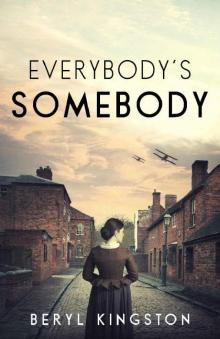 Everybody's Somebody
Everybody's Somebody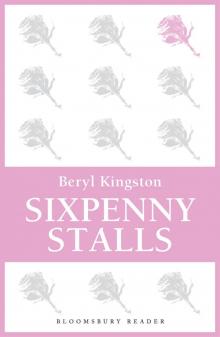 Sixpenny Stalls
Sixpenny Stalls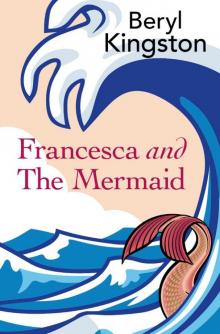 Francesca and the Mermaid
Francesca and the Mermaid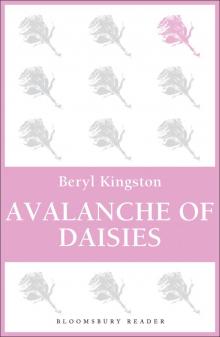 Avalanche of Daisies
Avalanche of Daisies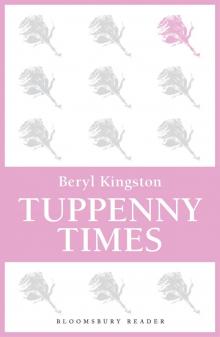 Tuppenny Times
Tuppenny Times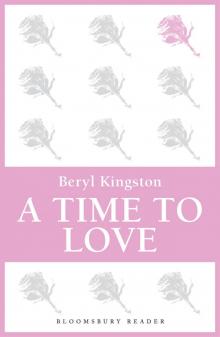 A Time to Love
A Time to Love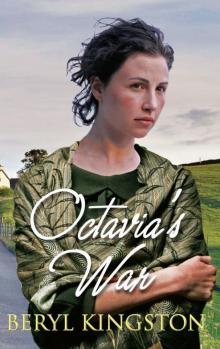 Octavia's War
Octavia's War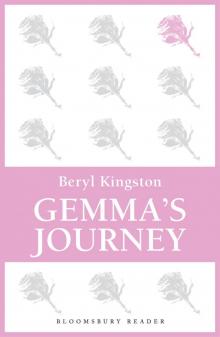 Gemma's Journey
Gemma's Journey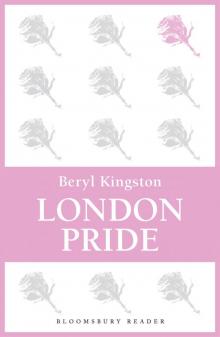 London Pride
London Pride Gates of Paradise
Gates of Paradise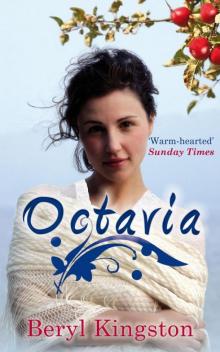 Octavia
Octavia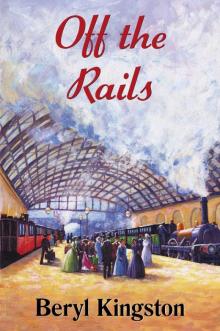 Off the Rails
Off the Rails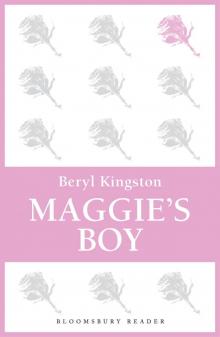 Maggie's Boy
Maggie's Boy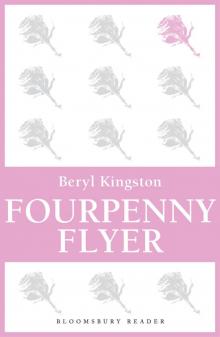 Fourpenny Flyer
Fourpenny Flyer